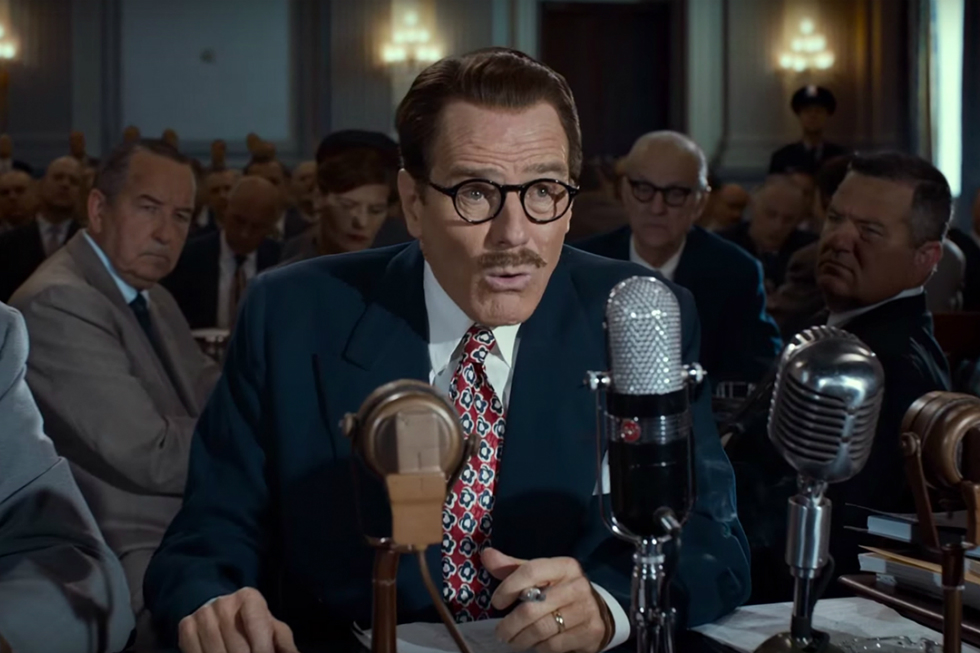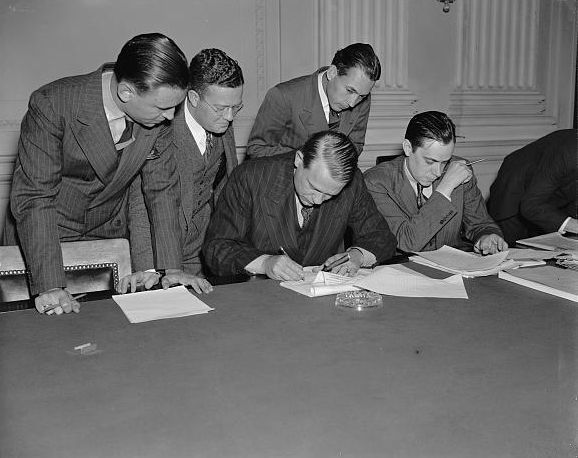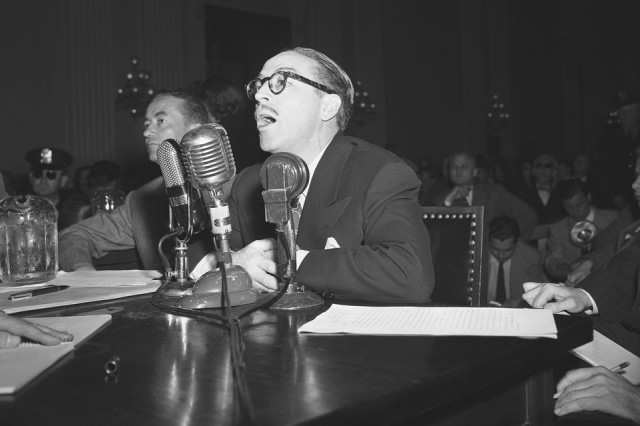American Maverick Or Red Menace? Trumbo (2015) — Reviewed

Jay Roach’s new film about Dalton Trumbo, says Adrian Challis, is a chance to shed light on a period of American anti-Communist history that we would rather forget…
Perhaps unlike most people, I wasn’t completely unaware of the existence of Dalton Trumbo before seeing the new film. I wrote my undergraduate Film Studies dissertation about Stanley Kubrick, focusing on his ‘future trilogy’ and the period when Kubrick was at the height of his powers, and gave us Dr Strangelove (1964), 2001: A Space Odyssey (1968) and A Clockwork Orange (1972), three films that have hardly been bettered in the decades since. So I knew Dalton Trumbo as the screenwriter for Kubrick’s 1960 epic Spartacus, and always thought it very daring of Kubrick to commission a barely concealed Marxist reading of that Thracian slave’s revolt against the might of the Roman Empire. But not even I knew quite what a remarkable subject Trumbo would make for a movie.
Directed by Jay Roach, whose previous films include several in the Austin Powers and Meet The Parents franchises, I was expecting a competent but unstartling Hollywood biopic, and in many ways that is exactly what Trumbo is. And that’s a good thing, because it is the story here that is so fascinating, and excessive artfulness is a welcome absence. The film tells the story of a successful screenwriter whose life was ripped apart by the anti-Red paranoia that infected America in the 1950s.
Known by many as ‘the Eisenhower siesta’, a period of drab conformity and consumer indulgence, the 1950s emerge in this film as a decade of horror for many of the most talented American creatives, whose lives and careers were plagued by the actions of Senator Joe McCarthy and his House Un-American Activities Committee (HUAC). Many of those creatives couldn’t get arrested in Hollywood at the time; Trumbo did get arrested, and was sent to a grim Kentucky prison for the crime of holding the proceedings of Congress in the contempt they rightly deserved.

On his release, Trumbo moved his long-suffering family to a modest suburb and attempted to rebuild their lives. But Hollywood had other ideas, and various agents, for example John Wayne (David James Eliot) and the egregious Hedda Hopper — played here with icy insouciance by an always brilliant Helen Mirren — hounded Trumbo, his fellow-travellers and the entire Hollywood hierarchy into red-hating submission. Once the world’s highest paid screenwriter and winner of an Oscar for his script for Roman Holiday, Trumbo’s name disappeared from all credits, replaced with that of his friends and numerous pseudonyms to enable him to carry on writing for what was, by Hollywood’s standards, a pittance.
Trumbo, however, didn’t appear to care much. Played with the usual genius we associate with Bryan Cranston, the man Anthony Hopkins described as ‘truly a great, great actor’ – Hopkin’s fan letter to the Breaking Bad star can be read in full here – Trumbo comes over as a classic American maverick; his writing fuelled by Benzedrine, whisky and political righteousness but never slipping into self-pity, which given the trials he was put through is remarkable. Going from earning a fortune for his scripts, Trumbo accepted a role writing B-movies for Frank King, played here with gusto by an always excellent John Goodman.

There are cameos for other stars, like the less than dazzling Louis CK playing Trumbo’s closest friend Alvin Hird, whose early death the film attributes to the stress HUAC’s machinations engendered in many of its victims. As Otto Preminger and Kirk Douglas, Christian Berkel and in particular Dean O’Gordon are both vivid and satisfying. The historical Douglas it would appear deserves much praise for his courage and conviction — it was thanks to him in part that HUAC’s vice-like grip on Hollywood was finally loosened. That and the fact that none other than the President-elect of the USA praised Trumbo’s work on national television, an incident illustrated here and marvellously intercut with Hedda Hopper’s appalled reaction.
But for a long time HUAC’s malign influence held sway in an America obsessed with ‘the Red Menace’. Many of the greatest film artists of the 1940s had their work pilloried and disdained. Many committed suicide. Many others swallowed their principles and testified to HUAC, ruining the careers of their once comrades — the film illustrates this with the case of Edward G. Robinson, who stands in for many in this murky history who were ‘duped and used’. There is not enough space here to detail the impact HUAC had on these careers, many of them ended abruptly by the actions of the dipsomaniacal Senator for the State of Wisconsin. Many never worked again.
Some, like the amazing director Jules Dassin, went into self-imposed exile; filming a noir in London at the time, Dassin was warned by Fox producer Darryl Zanuck not to return to face HUAC, advising him to stay in London and shoot the most expensive scenes of his film Night & The City (1950) first; that way the studio would have invested too much in the production to cancel it. The result is one of the best films of the period and certainly the best noir ever shot in Britain – see if you can track it down, I promise you will not be disappointed.
But before you do, go and see Trumbo — I have only given glimpses of quite how much fun the film is; I could have written another entire article about its innovative use of CGI alone. There are some excellent performances too, in particular by the female actors throughout — a special mention should go to Diane Lane and Elle Fanning, playing Trumbo’s wife Cleo and daughter Niki respectively, and respectfully. It makes a great Sunday afternoon movie.
Adrian Challis
Trumbo (2015) screens at FACT Liverpool and on general release around the UK until March 2016





